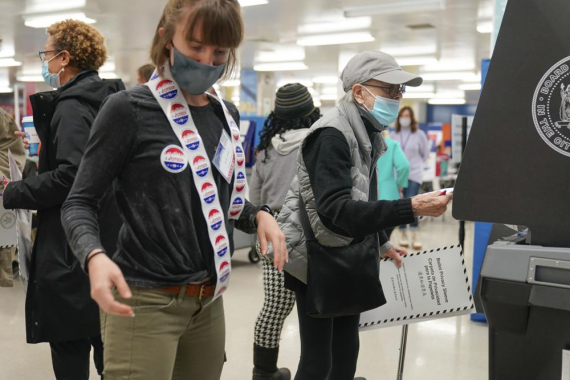
RICHMOND, Va. (AP) — Virginians cast their ballots on Tuesday in the state’s tight, bitterly fought race for governor, the first major test of how voters feel about Joe Biden’s presidency.
The race was supposed to be a comfortable win for Democrats in a state Biden won by 10 points last year. Instead, Terry McAuliffe, a prominent figure in Democratic politics and a former Virginia governor, has been locked in a dead heat with his Republican rival, businessman and political newcomer Glenn Youngkin.
The bruising, costly campaign has centered on issues including Youngkin’s ties to former President Donald Trump, the future of abortion rights and culture war battles over schools.
But the results may ultimately be interpreted as an early judgment of Biden. A year after he swept the state, the competitive nature of the governor’s race was a sign of how his political fortunes have changed. The White House has been shaken in recent months by the chaotic withdrawal of U.S. forces from Afghanistan, a sometimes sluggish economic recovery amid the pandemic and a legislative agenda at risk of stalling on Capitol Hill.
A loss in a state that has trended toward Democrats for more than a decade would deepen the sense of alarm inside the party heading into next year’s midterm elections, when control of Congress is at stake.
Voters were making “a statement that will be heard across this country,” Youngkin told a large crowd that chanted “USA! USA!” during his final rally Monday night. “The future of this commonwealth, the future of this country is going to be decided.”
McAuliffe countered that a GOP win would roll back progress his own party has made and would buoy Trump and his talk of 2024. “Folks, the stakes are huge,” McAuliffe said.
After a hectic final push that saw both crisscross the sprawling state, McAuliffe and Youngkin kept their Tuesday schedules low key. Both planned election night events in northern Virginia.
At the polls on Tuesday, Cassandra Ogren, 29, of Norfolk, said she had voted for McAuliffe in part because of his support for abortion rights and her concern about restrictions recently enacted in Texas. But she was also motivated by Younkin’s ties to Trump, who had endorsed him.
“Anyone endorsed by President Trump is not someone I want representing me,” she said.
For Barbara and Winton Smithwick, the governor’s race was almost entirely about rebuking the former president and “anyone who supports Trump.” They voted for McAuliffe — but not necessarily because of his campaign.
“It was more against Trump than for McAuliffe. It really was,” said Barbara Smithwick, 85, a retired nurse, who, like others, also cited the Jan. 6 insurrection at the Capitol building as an event that influenced her decision.
Schools, meanwhile, seemed to be at the forefront of many Youngkin voters’ minds. His pledge to ensure parents have greater say in what their kids are taught became a centerpiece of his campaign — possibly foreshadowing similar arguments GOP candidates will use across the country next year.
At Robious Middle School in the Richmond suburb of Chesterfield County, Jason and Beverly Ivey, both 48, cited education as a reason why they’d voted Republican.
A mother of seven children, the youngest in sixth grade, Beverly Ivey said that “parents deserve and need to have knowledge of what’s going on” inside the classroom. “You should have a say in the curriculum of the school.”
She was referring to a McAuliffe comment during a debate that became a centerpiece of the campaign. “I’m not going to let parents come into schools and actually take books out and make their own decisions,. … I don’t think parents should be telling schools what they should teach,” he had said. Youngkin ran TV ads of that second sentence hundreds of times in the campaign’s closing days.
In Norfolk, Bennett White, 24, another Youngkin voter, also cited the remark. He said he was concerned about McAuliffe’s education policies and didn’t want “our next generation of leaders to be looking at their peers in the lens of race.”
“My mom’s a teacher,” White said. “I just want to make sure that my mom is safe in the classroom and that her ideals and everyone’s ideals are protected, and we’re not turning into brainwashing academies.”
Elsewhere on Tuesday, New Jersey Gov. Phil Murphy was trying to win reelection against Republican former State Assembly member Jack Ciattarelli. If successful, Murphy would be the first Democrat reelected as the state’s governor in 44 years, though New Jersey hasn’t voted Republican for president since 1988.
Mayor’s offices in many of the nation’s largest cities were also at stake. And a ballot question in Minneapolis could reshape policing in that city, where the killing of George Floyd last year touched off sweeping demonstrations for racial justice across the nation.
But no other race in this off-year election season received the level of attention of the governor’s campaign in Virginia. That’s in part because previous races in many states have sometimes foreshadowed voter frustration with a party newly in power.
In 2009, during President Barack Obama’s first year in office, Republican Bob McDonnell’s victory in Virginia previewed a disastrous midterm cycle for Democrats, who lost more than 60 House seats the following year.
Copyright 2021 The Associated Press. All Rights Reserved. This material may not be published, broadcast, rewritten, or redistributed. Photo: AP




















